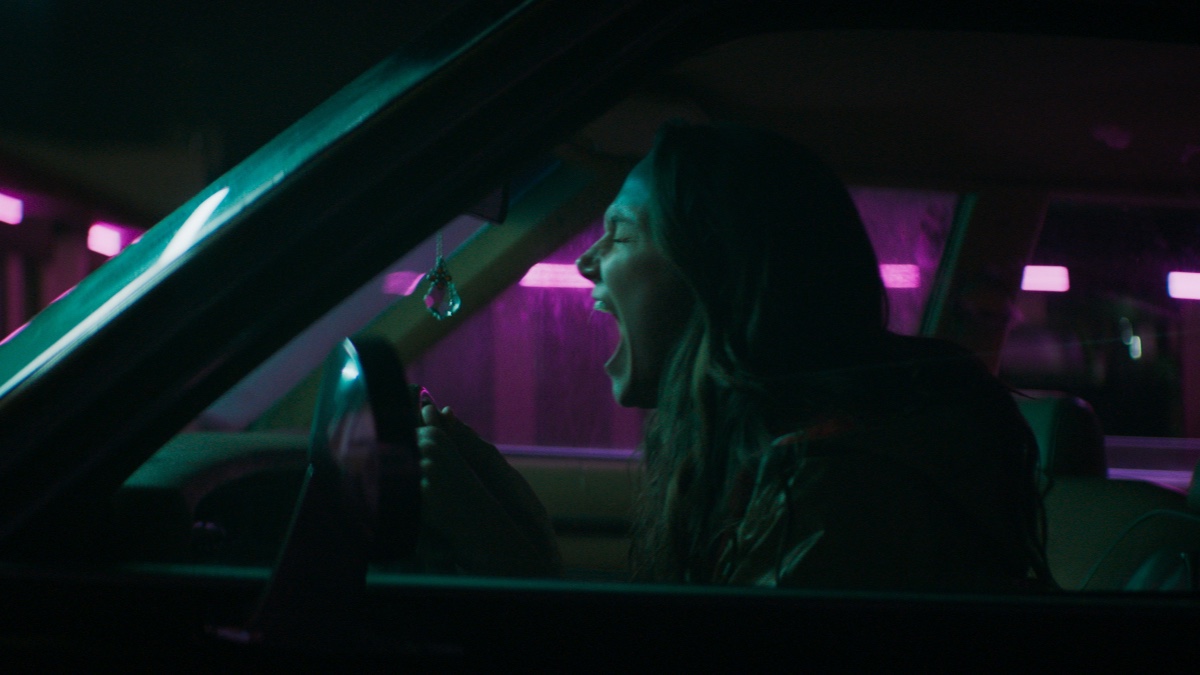
Back in 2014, Irish filmmaker Ivan Kavanagh delivered an absolutely masterful “horror” film called The Canal, which played a number of festivals after premiering at the Tribeca Film Festival before being released that October.
Kavanagh’s back with another film that some might deem horror called Son, which stars Andi Matichak (Halloween) as a single mother on the run with her son David (Luke David Blumm), who is afflicted with a debilitating illness that comes and goes. When a local detective, played by Emile Hirsch, looks into claims by the woman that a cult-like group may have poisoned her son and made him sick, he starts to investigate, but David’s spells of illness might lead to something far more foreboding and nefarious.
As with The Canal, Kavanagh has created another film that has all the terror and gore of a horror film but proves to be something far more than the genre normally produces. In fact, saying any more about the plot might take away from the horrifying images and tension that Kavanagh and his cast and crew bring to every single scene.
Below the Line got on the phone with Kavanagh, who is currently residing in Sweden, to talk about Son.
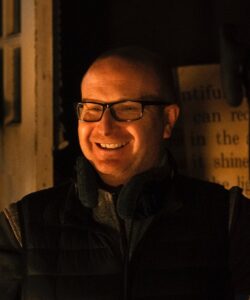
Below the Line: This is another movie that’s hard to talk about, because you don’t want to spoil any surprises. You’re watching this serious drama about a single mother and her kid who gets sick and then it completely goes off the rails to a different place. So we’ll try to avoid spoilers. What was the idea that got you down the road of writing and making this? It’s obviously as unique a movie as The Canal was.
Ivan Kavanagh: Actually, five years ago, when my son was born, my son Sean, he had a very difficult birth, and we were very worried about him the first few months of his life. We had a really tough time. He was crying a lot, and we got hardly any sleep. During that time, we were really worried during all of this stress. I could see how close him and his mother were becoming. That mother-son bond is so strong. There’s something primal about it. It’s much different from a child and a father bond — much, much different, much stronger. I began to think, is there anything a mother wouldn’t do to protect her son? Is there any length she wouldn’t go to keep him from harm? That was the starting point for Son. It was those very personal fears as well, about a child being sick and feeling helpless, because you can’t help the pain that he’s in. That was the seeds of it and then the story unravels from that.
BTL: What did your wife think when she first read or heard about it, or saw it?
Kavanagh: She knows what I’m like. Actually, we met when I came here to Sweden to screen at a Fantastic Fest here in Sweden, and she worked for the horror movie festival. So she loves horror movies as well, and Christina, my wife, she knew what I was like when she met me. So she knows what I do with my life and how I weave it into my films, but she knows this is only the shades of it. I find horror movies and movies in general, my movies, are a way for me to do therapy really. I pour all of my nightmares and my fears into my movies, and it feels therapeutic at the end. It seems like I cured myself of those fears in a way. It’s really strange, really cathartic.
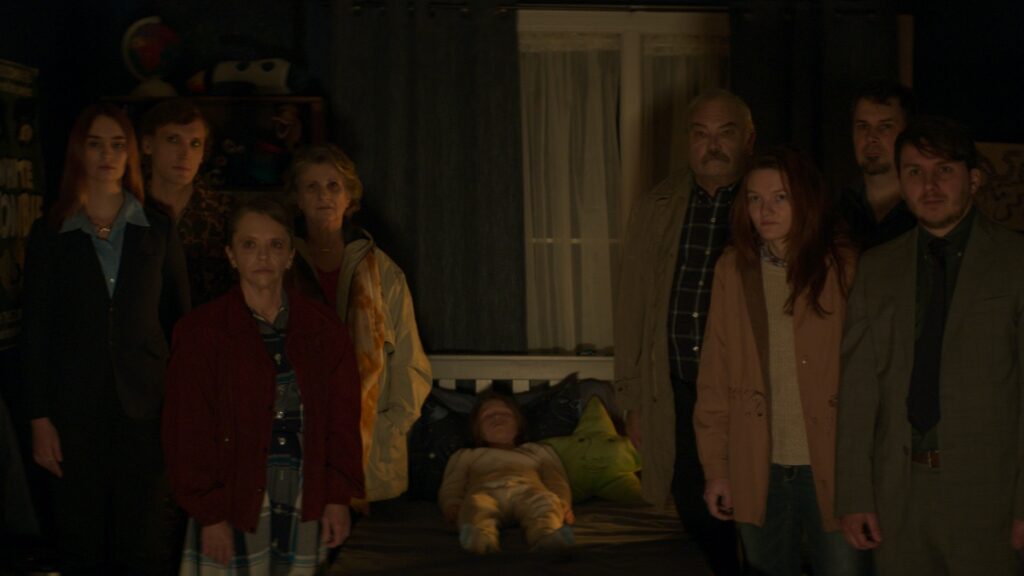
BTL: Meanwhile, you give nightmares to everyone who watches the movies. I was pretty disturbed while watching it, and was very worried I might not get a good night’s sleep. And I don’t even have kids.
Kavanagh: Oh, my gosh. This is like I passed it onto you, so you need to make a movie to get it out of your system. It’s like a chain, I just pass it from one person to another. [chuckles]
BTL: I remember when we spoke for The Canal, you didn’t really see that as a horror movie, so have you changed your thoughts on that, and is Son definitely a horror movie?
Kavanagh: I don’t know. I tried to get real emotions into it. I love horror and I hate when people say – and I hope I didn’t say this back in 2014. I hate when people say, “Well, it’s elevated horror.” I really don’t like it being labeled as a horror film, and I really do. I think some of the best examples in the entirety of cinema are horror movies. I kind of changed my mind on that one. I think The Canal is a horror movie, but has very real raw elements in there, and so with this one. I think that’s what’s great about horror movies. I think you can convey all of these subtexts, all these personal things in the guise of a horror movie. And if the audience wants to see it as pure entertainment, as a pure horror movie experience, they can do that, or they can read much more into it. I certainly do. I try to get as much personal stuff in there as I can. Maybe that’s what I meant back in ‘14, but both of them are horror movies, that hopefully have an added bit of extra something, I dunno.
BTL: When we spoke in 2014, I don’t think “elevated horror” was even a term yet, since that was before Jordan Peele and The Witch and Hereditary. You may have inadvertently started that horror sub-genre.
Kavanagh: [laughs] I hope I wasn’t the one who referred to it as elevated horror at the very beginning. I hope I didn’t start that, ‘cause I hate that.
BTL: Although this is for Below the Line, I do want to ask about casting Luke, because I remember you having trouble finding a kid for The Canal as well. In this one, Luke has to do a lot of difficult stuff, including gore and make-up.
Kavanagh: Yes, absolutely. I have a lot of experience now with directing kids from The Canal and Never Grow Old, the one I did after, the Western that had two kids in it, and then Luke. I mean, it’s all about the casting, the kids. It’s about finding the right child for the role. Like in The Canal, I didn’t want a movie kid, I wanted a real kid, and a kid that came across on camera as real and authentic. That was the only way to carry us through such a crazy story and fantastical story was to ground it in some sort of reality. We auditioned about 500 kids, similar to The Canal, I think. It was only at the very end of the process, when we opened it up. At the beginning, we were looking at New York mainly, and in LA, but I wasn’t satisfied. Some very good kids came in, but I knew it wasn’t the right one.
Then I saw this self-taped audition that Luke did. It came in, and he was just phenomenal in it. I knew the moment that I’d seen this tape that this is the kid. I rang the producers and said, “I found him. I’ve just gone to go drive to Atlanta now, from Mississippi, just to meet him and his father, and just to make sure.” The moment I walked in the room, and we did some improv, I knew it would be him. He has a great help, and I had a great help with Luke with his father. His father was an actor as well, or is an actor, his father Matthew. So I was able to say to Matthew, “You should watch Cries and Whispers by Ingmar Bergman, and just look at the reaction of the woman to the pain of cancer. That’s the kind of reaction I want Luke to convey on screen.” So Luke didn’t have to watch any of that, of course, Matthew watched it, and then he was able to go to Luke and coach him and help to begin doing that. By the time he arrived on set, all I had to do was tweak his performance and push him a bit further.
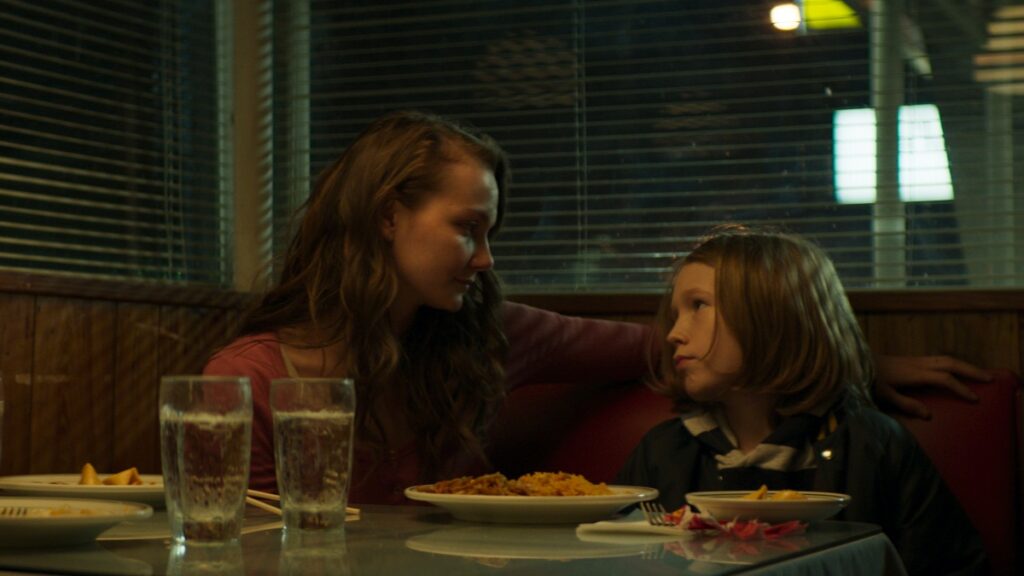
And he was just phenomenal—he blew us out of the water, it was amazing. That role would be hard enough for an adult, never mind a child. But with a child, especially in The Canal and this one, you need to treat everything like a game, and you need to separate the child from too much horror and fear and stuff like that. That’s very easy to do and you just keep everything like a game and make sure they know how everything is made and take them out of the room when there’s anything too graphic. We usually shoot his side first and then take him out and then shoot the opposite angle. I have a lot of experience on that stuff, but he was amazing enough in the film.
BTL: I’m sure he must have loved the special make-up effects and the gore, because kids…
Kavanagh: They love that stuff! He kept saying, “More, more, more…” especially because I made sure he was there when everything was being made from the ground up. So he knew how everything works, and he knew how all of the makeup effects were being constructed. He knew how the makeup was applied or what the blood was made of, so everything just seemed like a game and everything was very technical for him. At the end of the shoot, he didn’t want to leave, he loved it. Great kid. Highly intelligent and way beyond his years and just phenomenal.
BTL: Did you film the entire movie in Ireland?
Kavanagh: No, we shot in Mississippi.
BTL: I wondered where you found that suburban looking house in Ireland. I didn’t realize they made houses like that there.
Kavanagh: [laughs] We shot in Cleveland, Mississippi. We shot in Clarksdale, Mississippi. And also in Greenville and Greenwood as well. Amazing places with all those motels. That stuff doesn’t exist in Ireland. That’s pure America. Like the pimp motel with the factory behind them, that was just phenomenal. That find was crazy. We scouted locations for about a month before we shot, just me and the location scout. When I saw that motel with the factory behind it, it was like hell on earth. It was so visually arresting you know, amazing.
BTL: I’ve spent a lot of time down there at the Oxford Film Festival. While you were in Clarksdale, did you get to go to the Ground Zero Blues Club or were you too busy working?
Kavanagh: Oh, yeah. Yeah, I went to Ground Zero, the Blues Club, and I went to dinner with Morgan Freeman and yeah, had a great time down there, it was amazing. The Mississippi people were so welcoming to the film crews, and I kind of felt very uneasy, because of the subject matter of the film, and they’re extremely religious there. It felt a little bit odd. I felt a bit afraid to tell them what the film was about, but no, they were all amazing, so welcoming. The people were just lovely down there, lovely.
BTL: I want to talk about working with Aza Hand, who does your music and sound design. You’ve worked with him since The Canal as a mixer and sound designer but on this, he’s a full-on composer and does the sound. I’m curious about working with him because the music and sound design adds so much to the suspense.
Kavanagh: Before The Canal, the feature films that I made I did my own sound design. Sound Design is something that I hear as I’m writing it, like a piece of music, and when I met Aza, he was the perfect collaborator. At the beginning of a film or when the film is finished, I show him the film. I go through scene by scene and say where the sound design should rise, what kind of sound there should be here, and he always does what I say, but he adds so much more than I was expecting. It just seemed like a natural progression for him to go on to the music from the sound design. For me, I always loved sound design that’s bordering on music and vice versa, he’s a very musical person. We spend as much time on the sound editing and the sound design as we do on the picture editing, because for me, it’s half the film. It’s so particular to me, because I already hear the sounds when I’m writing the script. It’s just all there, and Aza’s the only person I’ve ever met who is able to get it down in reality from what’s in my head. He says it’s like a jigsaw puzzle that it takes him ages to get it out of my brain. But once it gets out, it just completely flows. Great working relationship. We’re going to keep working together.
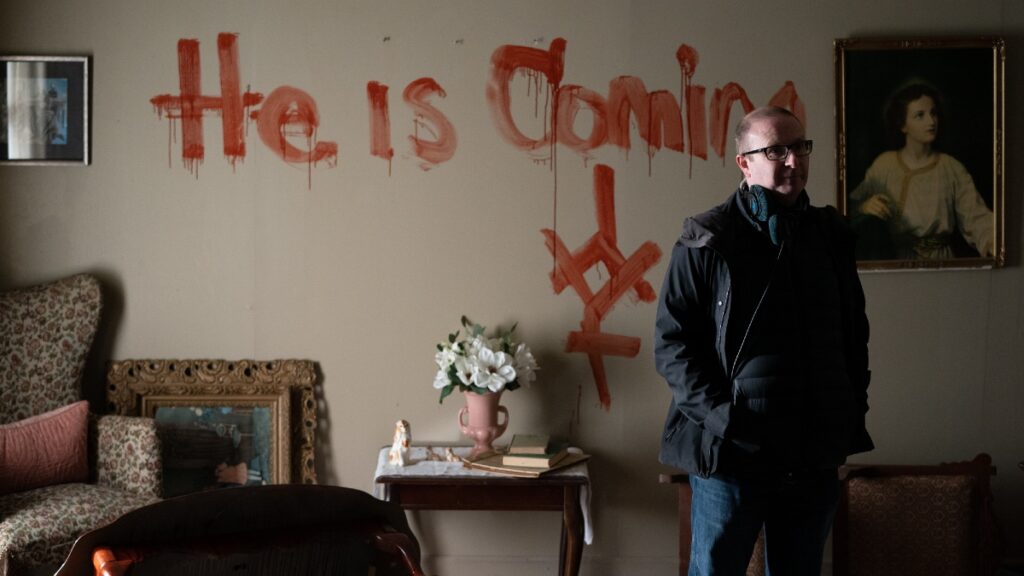
BTL: I assume you finished shooting right before COVID, so did you do all of the post in remote, pretty much? How was it doing that stuff? Was it easy to transition fairly easily?
Kavanagh: Yeah, we were so lucky. I mean, we stopped shooting literally when I was getting on the plane from the shoot on the way home to Ireland, I was hearing people on the plane, all these rumors about lockdowns and COVID, and all that sort of stuff. The next film to come into Mississippi straight after us was The Counter, Paul Schrader’s film, and they were shut down I think after three weeks. They finished it later, but they were shut down for a few months, so we were so, so lucky.
I was in Sweden, while my editor was in London, and we found this amazing remote software. I can’t remember the name of it offhand, but just incredible. I could see his screen, and I could see everything that he could see. You could talk to each other at the same time. I could see him as well on the screen. It was just like being in the same room. Not as good, but it was just like that. Then from Sweden, I flew to Ireland and I went into quarantine before I joined Aza in the sound studio and then we did the sound design together. It was difficult. I’d rather be in the same room always with the people I’m doing post-production with, but it worked out in the end.
BTL: Have you figured out what you want to do next? You must have just finished this a few weeks or months ago, I presume.
Kavanagh: Yeah, we just finished recently. No, I’m writing a TV series for MGM called The Vanishing Triangle. I’ve just finished writing the pilot, and another writer is finishing writing the second episode, and me and that writer have just finished doing the outlines for the eighth episode. We’re hoping to go into production with that in Ireland. It’s set in Ireland 1995. It’s a true crime series and loosely based on the true crime from 1980s in Ireland. It’s eight parts, and we’re hoping to shoot later this summer. I’ve also just finished a script – it’s a neo-noir called Vengeance with John Bossoff, the crime novelist, and I think it’s a fantastic script. We’re getting great buzz. We’ve had a lot of interest from some really top actors from it, so we’re really excited. That’s just gone out to financing at the moment. I’ve just sketched another horror film set in Ireland in the 17th century. It’s based on a true witchcraft trial — I think it’s an amazing story. And then I’ve been offered a couple of horror movie scripts that I’m considering as well, so I’m not sure exactly what will be next, but it will be pretty soon, I think.
Son is still playing in some theaters and is available digitally and on VOD.
All photos courtesy of RLJE Films.





